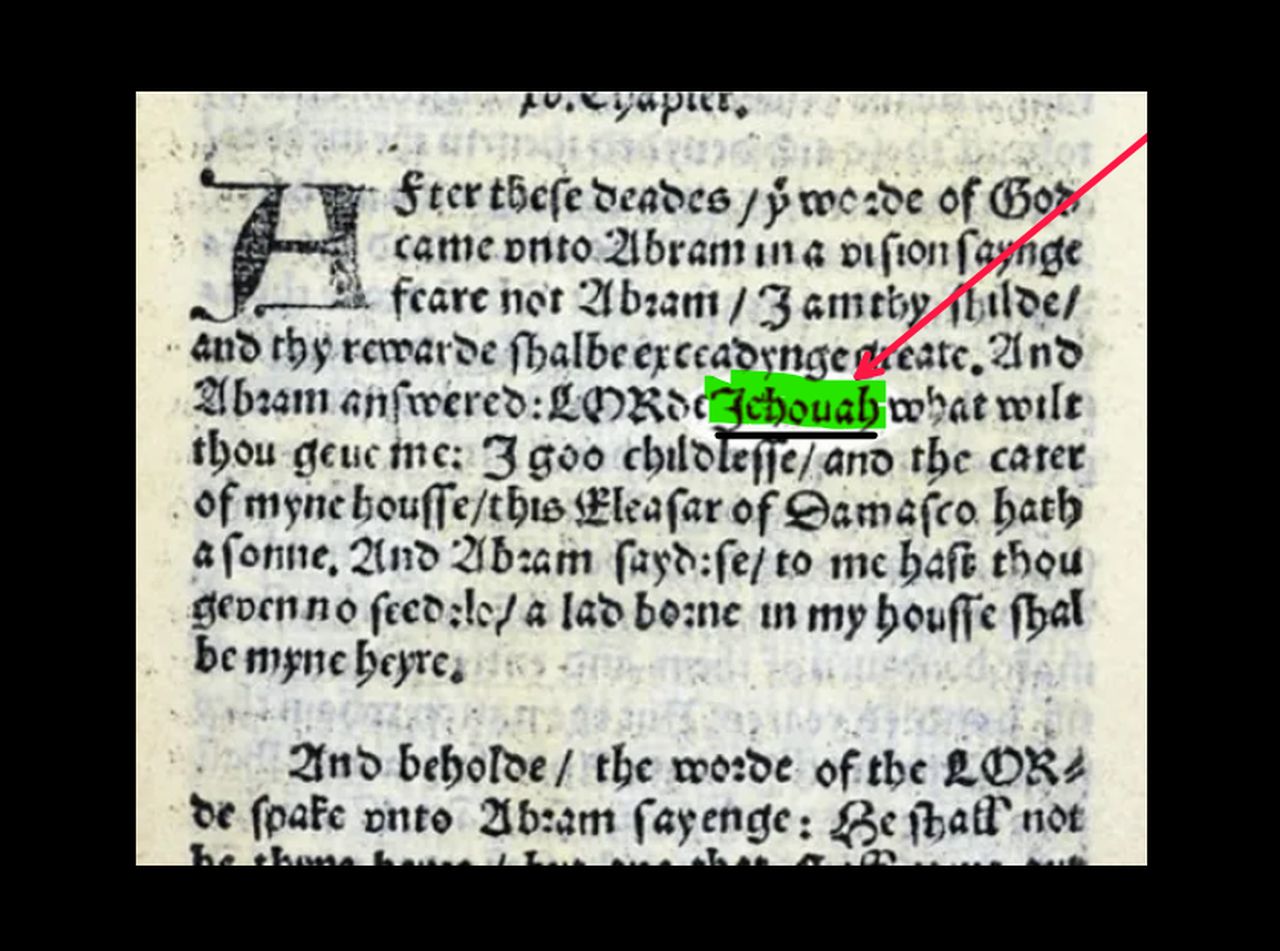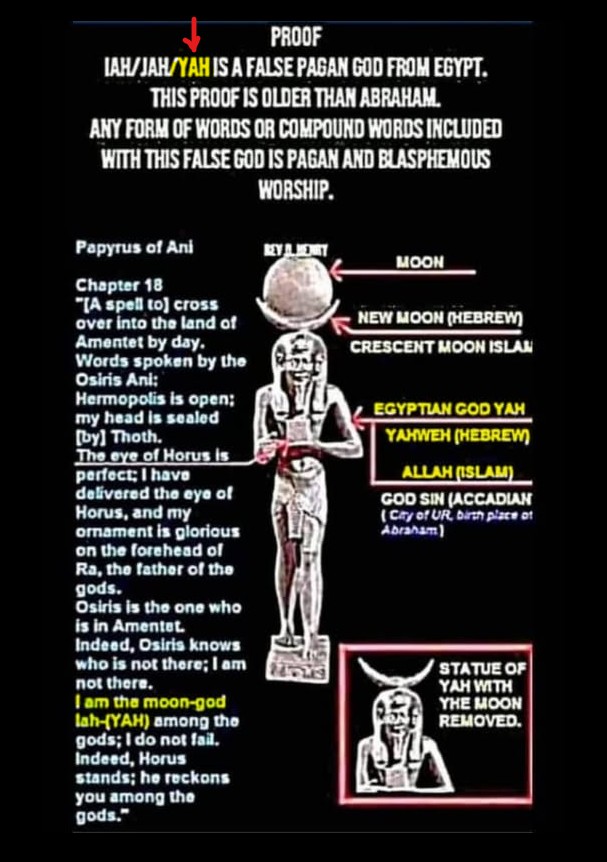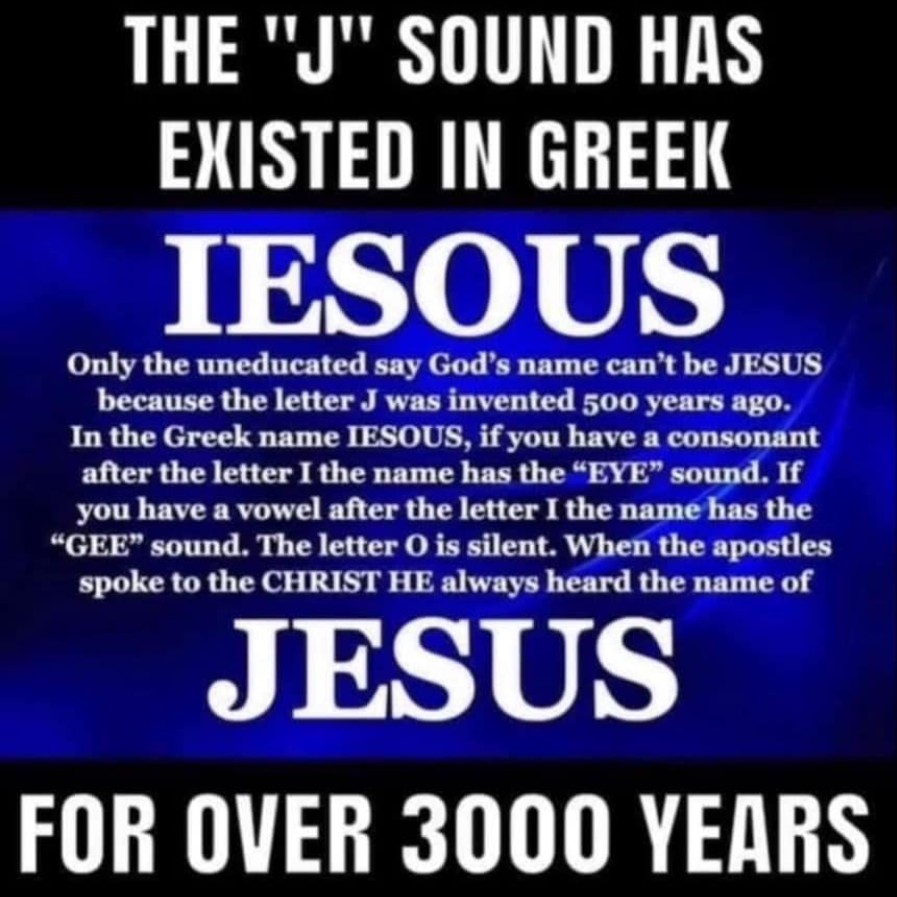Exploding the Lies – one by one. There are always the whiners who are looking to take issue with that which is of God, namely the written Word of God. Beware of the deceitful detractors – who, as their father the devil, whisper questions and doubts upon the LORD, His character, and His Word. Share to bless. The LORD kept His promise to preserve His Word to us (Psalms 12:6-7). Always remember saints, it is SATAN who is always behind the doubt casting upon God’s words, sowing confusion. Yet we have the “MORE sure word of prophecy” in the “exceeding great and precious promises” of the Holy Scriptures (2 Peter 1:3-4; 19-21, etc.). See Genesis 3:1; Mark 4:15, etc.. God kept His promise to preserve His Word to us in English in the King James Bible and in Spanish the Reina Valera, etc.
Beware of the uptick in the use of the cult of “yah” ….. that always puts up red flags for this disciple. HIS name is JESUS CHRIST. SAY IT WITH ME OUT LOUD – JESUS CHRIST!!!!! EVERY KNEE WILL BOW TO JESUS CHRIST!
“Wherefore God also hath highly exalted him, and given him a name which is above every name: 10 That at the name of JESUS every knee should bow, of things in heaven, and things in earth, and things under the earth; 11 And that every tongue should confess that JESUS CHRIST is Lord, to the glory of God the Father.” Philippians 2:9-11
There is “NONE other name” whereby one can be saved.
“… Jesus Christ of Nazareth … Neither is there salvation in any other: for there is none other name under heaven given among men, whereby we must be saved.” Acts 4:10, 12
ANY QUESTIONS?
Gail Riplinger on the name false names Yahweh, Yahushua, and Yuhuah.
Riplinger on the name game.
The name of God is spelled with the Hebrew letters yod, heh, vav, and heh, read from right to left and then transliterated into English as JHVH (called the Tetragrammaton). In the KJV Old Testament it is translated ‘JEHOVAH’ seven times (and rendered ‘LORD’ the remaining times; see New Age Bible Versions, pp. 373-385). Each of the letters of the Hebrew alphabet paints a picture. The letters in the name of God illustrate the following:
J = jod It suggests a ‘giving, extending hand’ (Marc-Alain Oauknin, Mysteries of the Alphabet, New York: Abbeville Press, 1999, p. 207).
H = heh =
It represents an ‘enclosure,’ like heaven or a window (Mysteries, p.191).
V = vav = It symbolizes a nail (Mysteries, p. 168). A ‘v’ in English is a pictogram of the chiseled end of a nail.
H = heh =
The H is repeated at the end of the name because “Jesus was risen” and “received up into heaven” again (Mark 16:19).
God reached his hand out of the windows of heaven, and we put a nail in it; having taken our punishment for sin, he has returned to heaven. The “nail” “pierced” “hands” of Jesus were foretold in Ps. 22:16 and Isa. 22:23-25. (Dr. Floyd Jones has even suggested that the sign recorded in John 19:19 might have been written in Hebrew, “JESUS OF NAZARETH AND THE KING OF THE JEWS,” creating an acrostic of the name JHVH, as the vav for ‘and’ begins the word for King, melek (see Hebrew O.T. Gen. 14:8 for Hebrew form). This could explain why the Jews immediately asked Pilate to change it to “he said, I am King of the Jews” (v. 21).
Jesus is a transliteration of the Hebrew ‘Joshua,’ meaning ‘JEHOVAH is salvation.’ Jesus Christ is shown to be the J, the jod “the arm of the LORD” in Isaiah 53:1-12 and Isaiah 59:16, which says, “therefore his arm brought salvation.” Isaiah 63:2, 5 repeats this theme. The jod, is a picture of an arm and hand, drawn in a tiny and compact form. Professor Ouaknin traced the jod from pictograms of a praising upright arm and hand, to outstretched arms, as if on a cross, and finally, to an arm and hand reaching down, like the letter reaching like Jesus to rescue perishing mankind (Mysteries, pp. 200-207).
In the 19th century, as unbelieving German critics of the Bible were hammering away at the word of God, they tried to refashion God’s name, JEHOVAH. They asserted that the God of Israel’s name should be pronounced Yahweh because, to them, he was nothing more than an offshoot of the pagan deity “Yaho.” Nothing could be further from the truth.
The Jews, who generally did not utter the name of God, had used, but ceased using the name JEHOVAH “centuries before the Christian era” notes the classic scholar’s edition of the Encyclopedia Britannica. It affirms that, “…reading what actually stood in the text, they would inevitably pronounce the name Jehovah” (Encyclop)dia Britannica, 11thedition (New York: Encyclop)dia Britannica, Inc., 1910-11), vol. 15, pp. 311-314, s.v. Jehovah). The New Schaff-Herzog Encyclopedia admits that in the “older system of transliteration, Jehovah” is the pronunciation. It states, “In the Masoretic text the usual form would give the pronunciation Yehowah [pronounced, Jehovah]” (The New Schaff-Herzog Encyclopedia of Religious Knowledge (New York: Funk and Wagnalls, 1912), vol. VI, p. 117, s.v. Jehovah; vol. XII, p. 470, s.v. Yahweh).
Thousands of years ago, perhaps 3,600, the name JEHOVAH was given by God to Moses. It is seen first in Genesis 2:4 in the Hebrew Old Testament and translated in Exodus 6:3 in the KJV. In his scholarly book, A Dissertation Concerning the Antiquity of the Hebrew Language, Letters, Vowel Points and Accents, John Gill (1697-1771), eminent theologian and writer, documents the use of the very name JEHOVAH from before 200 B.C. and throughout the centuries of the early church and the following millennium. The Hebrew’s Mishna allowed the name as a salutation (Berachoth, ix, 5); according to Thamid, the priests in the temple could use the true name, but those in the country could only use Adonai (vii, 2); Maimonides said the name was used by the priests in the sanctuary and on the Day of Atonement (Moreh Nebukim, I, 61, and “Yad chasaka,” xiv, 10). Even commentators such as Nicholas of Lyra, Tostatus, Cajetan, and Bonfrere defended the pronunciation ‘JEHOVAH’ as received by Moses on Mt. Horeb. The name is found in the writings of Raymund Martin in the 1200s and Porchetus in the 1300s. Theodore Beza, Galatinus, and Cajetan, among many others, use it in the 1500s. Scholars such as Michaelis, Drach and Stier proved the name as the original. The 1602 Spanish Bible uses the name Iehova and gave a lengthy defense of the pronunciation Jehovah in its preface. In “the 17th century the pronunciation JEHOVAH was zealously defended by Fuller, Gataker, Leusden and others, against the criticisms…”(EB, pp. 311-314). (Martin: Pugio fidei, ed. Paris, 1651, pt. III, dist. ii, cap. iii, p. 448, and Note, p. 745; Galatinus: “Areana cathol. veritatis,” I, Bari, 1516, a, p.77; Porchetus: Drusius, “Tetragrammaton,” 8-10, in “Critici Sacri,” Amsterdam, 1698, I, p.ii, col.339-42; “De nomine divino,” ibid., 512-516; see also p. 351 et. al; Michaelis: “Supplementa ad lexica hebraica,” I, 1792, p. 54; Drach: “Harmonic entre l’Eglise et la Synagogue,” I, Paris, 1844, pp. 350-53, Note 30, pp. 512-16, 469-98; Stier: Lehrgebaude der hebr. Sprache, 327.)
“Genebrardus seems to have been the first to suggest the pronunciation Iahue [pronounced Yahweh], but it was not until the 19th century that it became generally accepted” (EB, pp. 311-314). Anti-Semitic German liberals, like Driver and Delitzsch, eagerly grasped the new pronunciation, Yahweh. They and other unsaved ‘higher critics,’ denied that the Old Testament was actually given by God. They grasped at any straw to shelter their unbelief, asserting that the Old Testament was the creation of men who adopted and adapted stories, words, and names from neighboring pagan religions and languages. The higher critics used the new pronunciation, Yahweh, as so-called proof that the God of Israel was nothing more than a tribal god, whose name had evolved from pagan gods like Yaho or Ya-ve, worshipped by the Babylonians and Canaanites, the Hebrews’ captors and neighbors. They said, Yahweh “meant Destroyer” (EB, p. 312). The German critics said, “Yahweh is not a Hebrew name;” such a pronunciation would prove the Hebrews borrowed it (EB, 310-314). Critic Rudolf Kittel asserts, “yahu…do[es] not lead back to a pronunciation represented by Yehovah (or Jehovah)” (The New Schaff, vol. XII, p. 470, s.v. Yahweh). The critics cited ancient documents, like the “magical texts,” Aramaic papyri, and Babylonian tablets that tell of pagan gods named Yaho, Yahu, or Ya-ve. this pagan deity and mocking the God of Israel?)
Driver tried to provide as evidence, an Ethiopic list of magical names for Jesus, which included Yawe. Other Bible critics, anxious to find a linguistic, rather than a supernatural source for the name of the God of Israel, grasped the ‘Canaanite connection’ and the new pronunciation. (These critics include: von Bohlen (Genesis, 1835, p. civ.), Von der Alm (Theol. Briefe, I, 1862, pp. 524-527), Colenso (The Pentateuch, V, 1865, pp. 269-84), and Goldziher (Der Mythusbei den Hebr#ern, 1867, p. 327). (See also: Driver, Studia Biblica, I. 20; I, 5; Encyclopedia Britannica, 11th edition, 1910-11, vol. 15, pp. 311-314, s.v. Jehovah; Delitzsch, “Wo lag das Paradies,” 1881, pp. 158-164; “LesestKcke,” 3rd ed., 1885, p. 42, Syllab. A, col. I, 13-16).
Even the Oxford English Dictionary warns that “this origin is now disputed” (OED, s.v. Jehovah). So let’s examine why the critics of ‘JEHOVAH’ are wrong. The first letter, jod, could be pronounced in Hebrew, as ‘ye’ in Yeshua, the Hebrew pronunciation of Jesus, but it could not be pronounced that way in English. The English pronunciation and spelling of words which begin with the same Hebrew letter (jod) and vowel pointing (silent sheva Je ) – words like Jerusalem, Jericho or Jew – break the critic’s Canaanite idol, Yaho, in pieces. It cannot be pronounced ‘Ya’ in English. The sound of the Hebrew letter jod came into English as the letter ‘I,’ used as a consonant and having the soft ‘g’ sound, like today’s ‘j.’ In the past the letter ‘I’ was used as both a vowel (i) sound and as the consonant ‘j’ sound. The OED says that the sound of ‘j,’ though originally printed as ‘I,’ was pronounced as a soft ‘g’ (Oxford English Dictionary, Unabridged, 2nd Edition, Oxford: Clarendon Press, 1991, s.v. J). The ‘JE’ sound in JEHOVAH was spelled ‘IE’ and pronounced as ‘JE.’ To distinguish the consonant sound (soft ‘g’) of the letter ‘I’ from the vowel sound of ‘I,’ many scribes in the 1200s began putting a tail on the soft ‘g’ ‘I’,’ making it look like our modern ‘J.’ The Spanish, in the 1500s, were the first to more consistently try to distinguish the consonant I (soft ‘g’) sound as the shape of a ‘J.’ At that same time English printers used ‘J’ and ‘I’ fonts interchangeably (as documented elsewhere in this book). During the 1600s, most languages began consistently using the extended ‘I’ form, now called a ‘J,’ to represent the ‘j’ (soft ‘g’) sound. (World Book Encyclopedia, Chicago, Ill.: Field Enterprises, vol. 10, s.v. J.)
The Hebrews used Psalm 119 to teach the Hebrew alphabet. Psalm 119:73 was used to teach, the letter Jod (not yod), the hand pictogram. Interestingly, the first words of verse 73 are “Thy hands” ! These Hebrew letters are shown in King James Bibles printed by Cambridge University Press. The transliteration of the Hebrew letters as the Roman letters Yahweh requires a German accent (‘Je’ is ‘Ya’ in German), invented vowels, and a translator who does not know that the Germans, who transliterated it that way, pronounce the letter ‘w’ as ‘v’! Only the Latins (Roman Catholicism) and Germans (Higher Criticism), using the Roman alphabet, team up to pronounce ‘J’ as ‘Y.’ (There are no native German words that begin with ‘y.’) Even the untrustworthy Hebrew Aramaic Interlinear Old Testament, by Jay Green, admits, “…the letter J in German is pronounced like an English Y. The bulk of theological studies having come from German sources, there has been an intermixed usage in English of the J and the Y. Our English translations of the Bible reflect this, so we have chosen to use J, thus Jehovah, rather than Yahweh, because this is established English usage for Biblical names beginning with this Hebrew letter. No one suggests we ought to change Jacob, Joseph, Jehoshaphat, Joshua, etc. to begin with a Y, and neither should we at this late date change Jehovah to Yahweh” (The Interlinear Hebrew Aramaic Old Testament, 2nd ed., Peabody, Mass: Hendrickson Publishers, 1993, vol. 1, p. xii).
In summary, ‘JEHOVAH’ and ‘JESUS’ have always sounded and been pronounced exactly as they are today, as ‘JEHOVAH’ and ‘JESUS,’ although the type fonts used to represent these sounds sometimes looked like ‘Iehovah’ and ‘Iesvs.’ The letter ‘V’ is the other disputed consonant in JEHOVAH. “The vav is pronounced like a V in vehicle,” writes Professor Marc-Alain Ouaknin of the Department of Comparative Literature at the Hebrew Bar-Illan University and the Jewish Research and Study Center in Paris. Therefore the ending in JEHOVAH would be pronounced in Hebrew and in English as, ‘VAH’ not ‘weh.’ Professor Ouaknin also said that the letter vav went into the Greek alphabet, “bearing the name digamma and being pronounced “v” as in vehicle.” (Mysteries, pp.168, 170). The Ww in Gesenius’ [German] Hebrew Grammar and other Hebrew textbooks is pronounced Vav, in English and Hebrew. Readers misunderstand charts which say “Pronunciation…w,” not knowing that the letter ‘w’ is pronounced as a ‘v’ in German The sounds of Vav and the vowel which follows it, Kamatz (a), can be heard on the instructional Hebrew web site http://www.ejemm.com, pronounced exactly as it would be in JEHOVAH. (E. Kautzsch and A.E. Cowley, Gesenius Hebrew Grammar, 2nd English Edition, Oxford: Clarendon Press, 1910, pp. 2628 et. al; See also Menahem Mansoor, Biblical Hebrew, Grand Rapids,Mich: Baker Book House, 1980, pp. 18, 19, 21.)
Even Americans have heard Hogan’s Heroes, Sergeant Schultz say to Colonel Klink, ‘Ya vool Kammandant,’ (spelled “Ja wohl Kammandant,” meaning ‘Yes, indeed Commander’). In German restaurants Schultz said, ‘viener schnitzel’ (spelled wiener), vile he listened to the tunes of V gnr (spelled, Wagner) and Lood-vikh fan Beethofen, (spelled, Ludwig van Beethoven). In German, the letter ‘v’ is pronounced like an ‘f.’ Consequently, in Hebrew textbooks it was necessary to put the letter ‘w’ after the Hebrew vav (‘v’) so that German readers would know that the Hebrew letter ‘v,’ was not the German ‘f’ sound, but the sound of the letter ‘v’ represented by their letter ‘w.’ English speaking textbook authors and seminary professors have misunderstood this and misconveyed to their students that the Hebrew letter should be pronounced like the English ‘w,’ not the German ‘w.’
Where did the phony ‘weh’ sound in Yahweh come from? As Green said, “German sources.” In German “the “v” sound is rendered by the “double u” (“w”). Although the German critics spelled the name Yahweh, they pronounced it, Yahveh. “In German…W takes the value that V has in English…In German the same symbol w is called Vey, because in that language it has the value of the English v…” (EB, s.v. V; s.v. W; see also The Mysteries of the Alphabet, pp. 168, 170, 171). Because Germans use the letter ‘w’ for the ‘v’ sound, those reading or translating German theological works have brought in the German letter ‘w’ for ‘v.’ It is not to be pronounced like an English ‘w,’ but like a ‘v.’
To further compound the confusion, unbelieving Catholic Bible critics have brought their Latin ‘w’ pronunciation to the letter ‘v.’ “The Latin V, however, was…like the English w…Early borrowings, like wine(Latin vinum [pronounced winum]) [and] wall (Latin vallum [pronounced wallum]), retain the w sound and are therefore spelt with w” (EB, s.v. V; s.v. W). So we have Latin speaking Roman Catholic scholars and liberal German higher critics joining together to fight WW II against the God of Israel and the word of God. Even the NIV translators and editors of the corrupt Theological Wordbook of the Old Testament admit that confusion arises in part “because of past German influence on Hebrew studies.” Imagine 19th century anti-Semitic German scholars recasting the name of the God of Israel in the mold of Yaho, a pagan idol, who speaks with an untrained German accent! To further compound the confusion, there are two conflicting Hebrew systems of pronunciations: 1.) the Ashkenazi, a German method from Jews who immigrated to Germany and central Europe and then some to America and 2.) the classic Sephardi. (R. Laird Harris, Gleason L. Archer, Bruce Waltke, Theological Wordbook of the Old Testament, Chicago: Moody Press, 1980, vol. 2, p. x; The American Dictionary of the English Language, s.v. W; Mansoor, p. 33.)
Where did the VOWELS in JEHOVAH come from? Most believe the Bible record which states that the vowels in JEHOVAH were heard as, “the LORD said unto Moses…my name JEHOVAH” (Exod. 6:3). The statement, “the LORD said unto Moses,” is repeated over and over in the book of Exodus. Moses heard the pronunciation of words.“ And the LORD said unto Moses, Write…in a book…And Moses wrote all the words of the LORD” (Ex. 17:14, 24:4, 34:27, Num. 33:2, Deut. 31:9, 24.) The book titles in the KJV state that the first five books of “Moses” are the “beginning” of the “old testament” (Luke 24:27, 2 Cor. 3:14, 15).
-Gail Riplinger
Support | STORE | Podcasts | Jail/Prison Ministry | Mexico Mission here | All Ministry Updates | H.O.T. Bible Study [podcast] | Church History Exposed | Bible Agnostics Exposed | How to Spot a Fake Bible [podcast] | WHAT ABOUT PEOPLE WHO CAN’T UNDERSTAND THE KJB? [podcast] | New American Standard Version “Bible” NASV Catastrophe Exposed | The Audacity of Defending the New Versions | Do We Have God’s Word or Do You Need to Know the Original Languages? [podcast] | Bible Versions Category |




Articles
Rich in Faith [podcast]

“Them that Love Him”
——WHAT one temporarily has in this fleeting world or doesn’t have, has NOTHING to do with that person’s spiritual state. This is what Jesus taught: “Take heed, and beware of covetousness: for a man’s life consisteth not in the abundance of the things which he possesseth.” (Luke 12:15) In fact James says:
“HEARKEN, MY BELOVED BRETHREN, HATH NOT GOD CHOSEN THE POOR OF THIS WORLD RICH IN FAITH, AND HEIRS OF THE KINGDOM WHICH HE HATH PROMISED TO THEM THAT LOVE HIM?” JAMES 2:5
James says God chooses those for His eternal kingdom “that love him,” namely “the poor of this world.” We are justified by “faith” and not by what we do or do not temporarily possess in this fleeting life.
IF in your mind you rate people by what they have or don’t have in this fleeting sinful world, you are deeply deceived and in utter need of repentance and the washing of water by the Word of God. You are carnally minded (Romans 8:5-6).
Regrettably, it seems that most people professing to be following Christ, the One who gave all, are not the least bit concerned if their brother or sister has a need. God have mercy upon us and grant us repentance in Jesus’ Name! Are these people truly saved?
“Hereby perceive we the love of God, because he laid down his life for us: and we ought to lay down our lives for the brethren. 17 But whoso hath this world’s good, and seeth his brother have need, and shutteth up his bowels of compassion from him, how dwelleth the love of God in him? 18 My little children, let us not love in word, neither in tongue; but in deed and in truth. 19 And hereby we know that we are of the truth, and shall assure our hearts before him.” 1 John 3:16-19
“If we are in Jesus we have the unsearchable riches of Christ (Ephesians 3:8). Unfathomable (in our small minds), infinite wealth and spiritual blessings! Endless mercy, grace, and forgiveness. That is inexhaustible! Why do we need any worldly riches that will rot and corrupt our hearts!? Lay up in your hearts God’s riches! Which are eternal!” Karen Cochran
Some have tens of thousands in the bank and could care less to find out if a sister or brother has a need. The Bible assures us that they are not saved. If you have even a little to give and don’t, it’s because you simply have chosen not to know and abide in Christ.
“What doth it profit, my brethren, though a man say he hath faith, and have not works? can faith save him? 15 If a brother or sister be naked, and destitute of daily food, 16 And one of you say unto them, Depart in peace, be ye warmed and filled; notwithstanding ye give them not those things which are needful to the body; what doth it profit? 17 Even so faith, if it hath not works, is dead, being alone.” James 2:14-17
The financial institutions and their salesmen are vying for your money. They want your money to invest so that you and they earn a financial gain in this life. Christians in need, orphans, and Gospel workers are also available to invest in. To help them is to invest in the LORD’s kingdom and be repaid dividends for eternity. Oh, and your heart will follow where you choose to place your money. Jesus says “Lay not up for yourselves treasures upon earth, where moth and rust doth corrupt, and where thieves break through and steal: 20 But lay up for yourselves treasures in heaven, where neither moth nor rust doth corrupt, and where thieves do not break through nor steal: 21 For where your treasure is, there will your heart be also.” (Matthew 6:19-21)
PRAYER: Holy Father, please break me and make me Your authentic follower. Jesus I love You. Let me walk as You walked, live as You lived, love as You love. Bless this life You gave to be truly crucified with You – dead, buried, and raised up – a vessel of honor for Your glory! In Jesus’ name.
Let’s Grow Together! Sign up here to begin receiving the Moments with Our Master email devotional that is sure to help you grow in His grace and in the knowledge of our LORD and Savior Jesus Christ (2 Pet. 1:2; 3:18). It’s sent out for the edification of the body of Christ. Sign Up HERE.
Support | STORE | Podcasts | Jail/Prison Ministry | Mexico Mission here | All Ministry Updates | More on Assurance here | Because You Care Page | The Greatest of these is Charity | Be Ready in the Morning [podcast] | The Sure Mercies of David [podcast] | That Repentance and Remission of Sins should be Preached [podcast] | At His Feet | Knowing God | The Cross Life | 100’s of Christ-centered Scripture-rich Podcasts | Christology = the Study of Christ


Abiding
Safety in Wise Counsel [podcast]

“Every purpose is established by counsel: and with good advice make war.” Proverbs 20:18
“The steps of a good man are ordered by the Lord: and he delighteth in his way.” Psalms 37:23
“So teach us to number our days, that we may apply our hearts unto wisdom.” Psalms 90:12
“Safety” in wise counsel from God’s wisdom, Word, and including at times with the help of His beloved saints.
“Where no counsel is, the people fall: but in the multitude of counsellors there is safety.” Proverbs 11:14
“The horse is prepared against the day of battle: but safety is of the LORD.” Proverbs 21:31
“For by wise counsel thou shalt make thy war: and in multitude of counsellors there is safety.” Proverbs 24:6
Caprice means a sudden and unaccountable change of mood or behavior.
“Who is a wise man and endued with knowledge among you? let him shew out of a good conversation his works with meekness of wisdom. 14 But if ye have bitter envying and strife in your hearts, glory not, and lie not against the truth. 15 This wisdom descendeth not from above, but is earthly, sensual, devilish. 16 For where envying and strife is, there is confusion and every evil work. 17 But the wisdom that is from above is first pure, then peaceable, gentle, and easy to be intreated, full of mercy and good fruits, without partiality, and without hypocrisy. 18 And the fruit of righteousness is sown in peace of them that make peace.” James 3:13-18
Support | STORE | Podcasts | Jail/Prison Ministry | Mexico Mission here | All Ministry Updates | 100’s of Christ-centered Podcasts | Bible Books Narrated | Bible Study Helps | The Book of James Narrated [podcast] | The Book of Revelation Narrated [podcast] | Colossians Overview [podcast]


Articles
“Let Brotherly Love Continue” [podcast]

“Let Brotherly Love Continue.” Hebrews 13:1
“And walk in love, as Christ also hath loved us, and hath given himself for us an offering and a sacrifice to God for a sweetsmelling savour.” Ephesians 5:2
1 John 4
God Is Love
“7 Beloved, let us love one another: for love is of God; and every one that loveth is born of God, and knoweth God.
8 He that loveth not knoweth not God; for God is love.
9 In this was manifested the love of God toward us, because that God sent his only begotten Son into the world, that we might live through him.
10 Herein is love, not that we loved God, but that he loved us, and sent his Son to be the propitiation for our sins.
11 Beloved, if God so loved us, we ought also to love one another.
12 No man hath seen God at any time. If we love one another, God dwelleth in us, and his love is perfected in us.
13 Hereby know we that we dwell in him, and he in us, because he hath given us of his Spirit.
14 And we have seen and do testify that the Father sent the Son to be the Saviour of the world.
15 Whosoever shall confess that Jesus is the Son of God, God dwelleth in him, and he in God.
16 And we have known and believed the love that God hath to us. God is love; and he that dwelleth in love dwelleth in God, and God in him.
17 Herein is our love made perfect, that we may have boldness in the day of judgment: because as he is, so are we in this world.
18 There is no fear in love; but perfect love casteth out fear: because fear hath torment. He that feareth is not made perfect in love.
19 We love him, because he first loved us.
20 If a man say, I love God, and hateth his brother, he is a liar: for he that loveth not his brother whom he hath seen, how can he love God whom he hath not seen?
21 And this commandment have we from him, That he who loveth God love his brother also.”
1 Corinthians 13
“Though I speak with the tongues of men and of angels, and have not charity, I am become as sounding brass, or a tinkling cymbal. 2 And though I have the gift of prophecy, and understand all mysteries, and all knowledge; and though I have all faith, so that I could remove mountains, and have not charity, I am nothing. 3 And though I bestow all my goods to feed the poor, and though I give my body to be burned, and have not charity, it profiteth me nothing. 4 Charity suffereth long, and is kind; charity envieth not; charity vaunteth not itself, is not puffed up, 5 Doth not behave itself unseemly, seeketh not her own, is not easily provoked, thinketh no evil; 6 Rejoiceth not in iniquity, but rejoiceth in the truth; 7 Beareth all things, believeth all things, hopeth all things, endureth all things. 8 Charity never faileth: but whether there be prophecies, they shall fail; whether there be tongues, they shall cease; whether there be knowledge, it shall vanish away.”
Support | STORE | Podcasts | Jail/Prison Ministry | Mexico Mission here | All Ministry Updates | Because You Care Page | The Greatest of these is Charity | Be Ready in the Morning [podcast] | The Sure Mercies of David [podcast] | That Repentance and Remission of Sins should be Preached [podcast] | At His Feet | Prepared to be Used of God | Walking with Jesus on His Stated Terms – the Cross | Fasting and Prayer | The Old Man Must be Put Down [podcast] | The 5 Sins That Keep God’s People Out of Their Promised Land [podcast] | What Did Paul Mean by “I Keep Under My Body”? [podcast] | “Jesus the Author and Finisher of our Faith” [podcast] | A Living Sacrifice unto God [podcast] | Departing from Hell Beneath | Prayer



 America12 months ago
America12 months agoThe Drugging of America: The Pharmakeia Sorcery Deception [podcast]

 Articles2 years ago
Articles2 years agoChildren being Rescued in Tunnels: Happening Now – UPDATE!

 Articles8 years ago
Articles8 years agoSelf-Examination in Preparation for the Lord’s Return

 Apostasy2 years ago
Apostasy2 years agoSHOCKING List of False Prophets Most Believe are True
















































